Indian Muslim girls invoke Constitution as hijab row intensifies
Munawar Zaman
Press TV, New Delhi
Sadiqa, a 12th grade student in New Delhi is outraged. She says it could perhaps be the first time in Indian history that a particular community is being targeted for what they wear.
"Earlier it would be our mosques, what we eat, our marriages, our personal laws, now it’s what we wear. This is not the India I was born in."
Last week, a video circulating on social media became a sensation within a few hours. A young college girl from the southern Indian state of Karnataka was heckled by a group of saffron-clad Hindu radicals chanting slogans hailing Hindu deity Rama.
The girl responded back with chants of “Allah Hu Akbar”, which means “God is great”. The incident blazed the public sentiments with many calling the girl lioness, while others hailed her as iron lady.
As India state elections are underway, experts say polarizing the voters is a common phenomenon in India with religion being the easy tool.
Another college student who spoke on the condition of anonymity said the ruling BJP might rewrite the constitution considering the policies and actions they are imposing in a country known for its rich cultural and religious diversity.
Ban on Islamic headscarves has outraged the Muslim community, who see it is an outright attack on their faith that the constitution of India guarantees to safeguard. They say it could perhaps be an attempt to prevent Muslim women from acquiring education or to flare communal tensions amid elections.
Observers say anti-Muslim rhetoric has flared more aggressively since the BJP came to power in 2014. They say most elections in India since 2014 have been overly polarized. Religious divide has been the main trump card of the current administration in New Delhi.
Profile: Maj. Gen. Abdolrahim Mousavi, the martyred Chief of Staff of Iran's Armed Forces
Profile: Major General Mohammad Pakpour, the martyred IRGC commander-in-chief
Iran’s government declares 40 days of mourning over Leader’s martyrdom
American criminals and Israeli regime will 'regret' war of aggression against Iran: General Staff
Iran’s defense minister, chief of staff of armed forces assassinated in US-Israeli strikes
Pezeshkian condemns ‘savage’ US-Israeli attack on school that killed nearly 90
Islamic Jihad extends 'full solidarity' with Iran following Israeli-American aggression
Leader of the Islamic Revolution martyred in cowardly Israeli-American aggression









 This makes it easy to access the Press TV website
This makes it easy to access the Press TV website